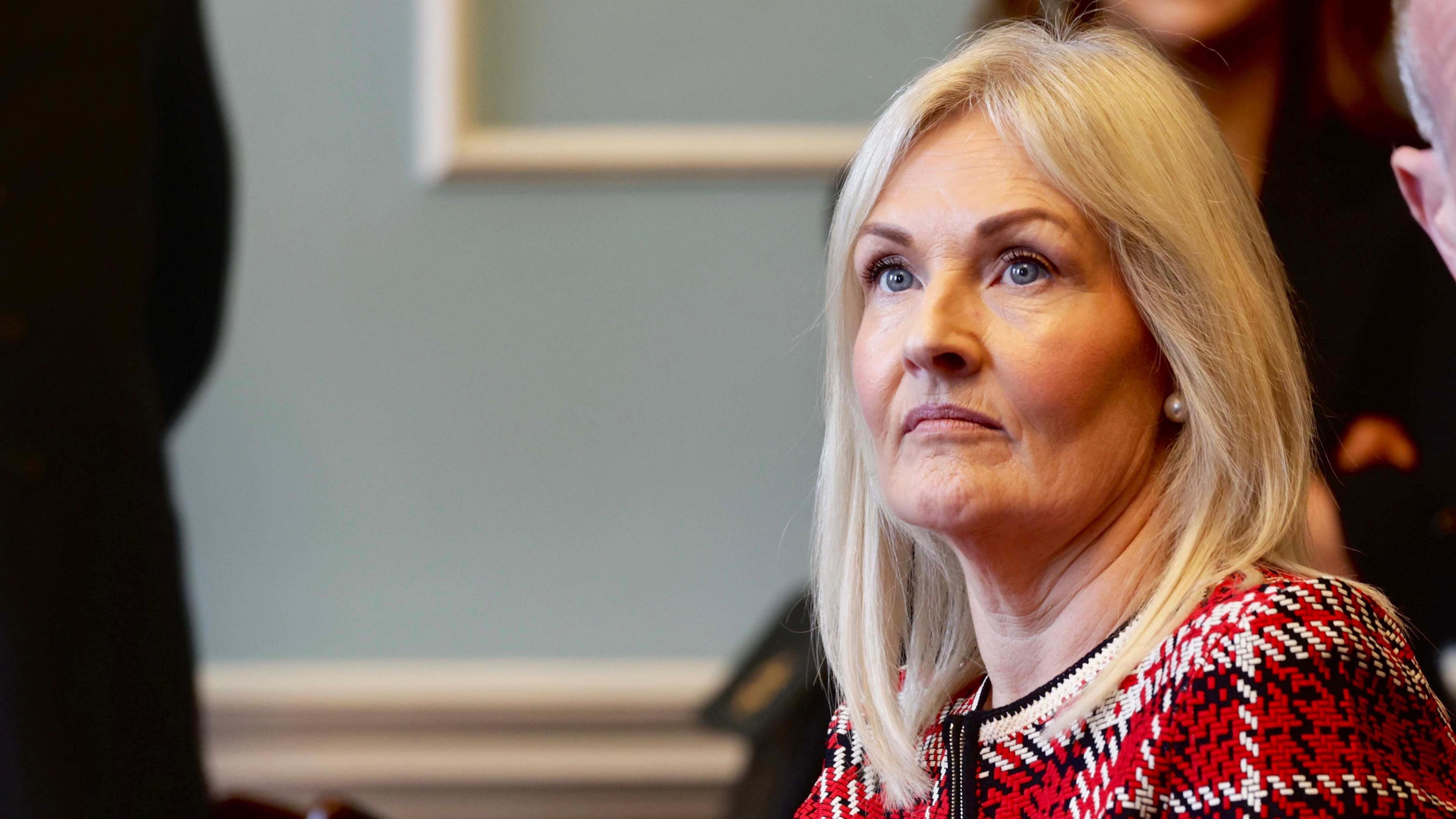Micheál Martin elected taoiseach after chaos subsides
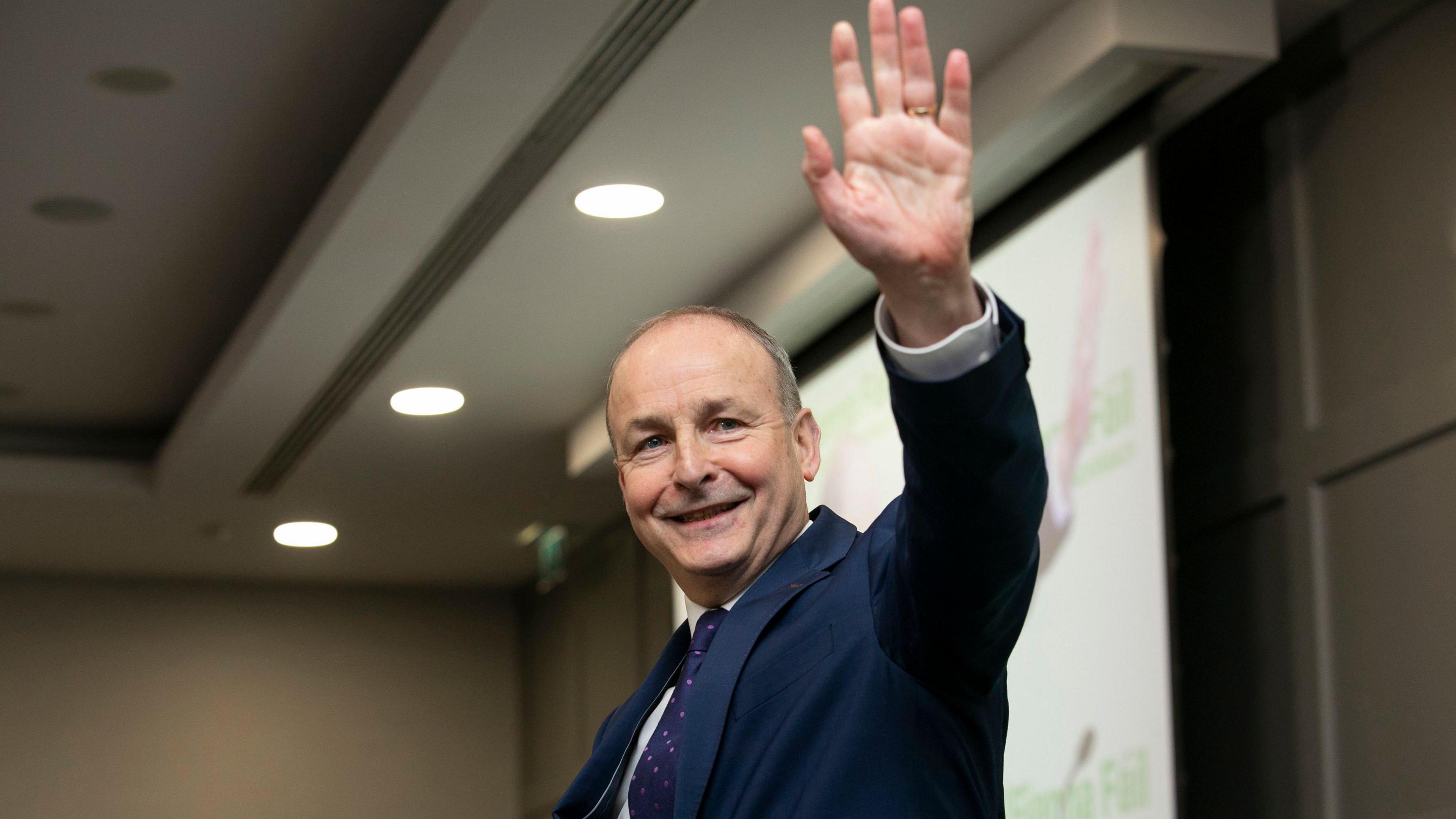
Micheál Martin is the leader of Fianna Fáil
- Published
Fianna Fail leader Micheál Martin has been elected taoiseach (Irish prime minister) for the second time after chaos in the Dáil (lower house of Irish Parliament) subsided.
The Dáil was suspended several times on Wednesday after a bitter row between government and opposition parties.
Martin is one of the longest serving TDs (MPs) in the Dáil having been first elected in 1989 to the constituency of Cork south central and was previously taoiseach between 2020 and 2022.
He will now hold that office until 2027 when Fine Gael leader and Tánaiste (Irish deputy prime minister) Simon Harris is due take over.
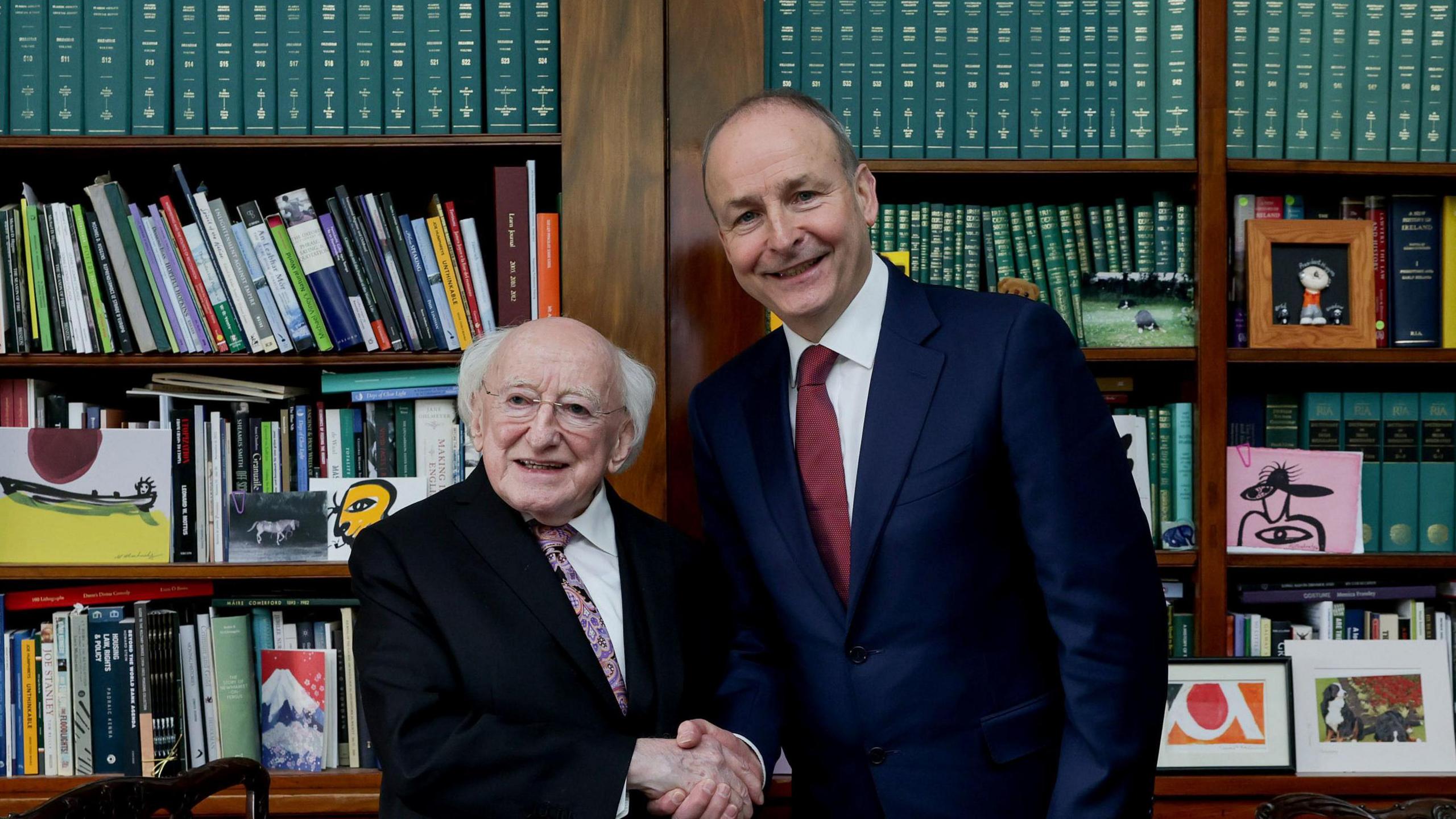
Martin received his official seal of office from Michael D Higgins on Thursday
In his acceptance speech, Martin said that it was "a sad development in many parliaments in the world that they have become more angry and divisive.
"They have become forums dominated by the inflated rhetoric of demonstrations rather than a place where different groups can argue in good faith and respectfully disagree," he said.
He added it was the anniversary of the death of his father Paddy.
"This week every year I remember all he did for us and the values which he lived by every day," he said.
Earlier on Thursday, Martin travelled to Áras an Uachtaráin (the presidential residence) to meet Michael D Higgins where he received his seal of office.
He then returned to Leinster House where cabinet ministers were appointed.
The 15 incoming ministers, alongside the taoiseach and tánaiste, arrived at Áras an Uachtaráin shortly before 20:00 local time to receive their seals before taking part in the first official cabinet meeting.
What happened on Wednesday?
Martin was due to be elected taoiseach on Wednesday but there were chaotic scenes in the chamber.
Sinn Féin and other opposition TDs (MPs) had voiced their anger at plans to allow independents who are supporting the government to sit on the opposition benches.
Fianna Fáil and Fine Gael emerged as the largest and third-largest parties respectively following November's election and committed to returning to government together.
However after the Green Party - their coalition partner from 2020-2024 - was reduced to a single seat, they gathered the support of a small group of independent TDs.
This was necessary to give them a majority in the Dáil.
Sinn Féin remains the largest opposition party after winning 39 seats.
Controversy began after four of the independent TDs who had agreed to support the government wanted to form a "technical group" along with two other independent TDs which would allow them speaking time and other rights from the opposition benches.
This group would be known as the Regional Independent Group.
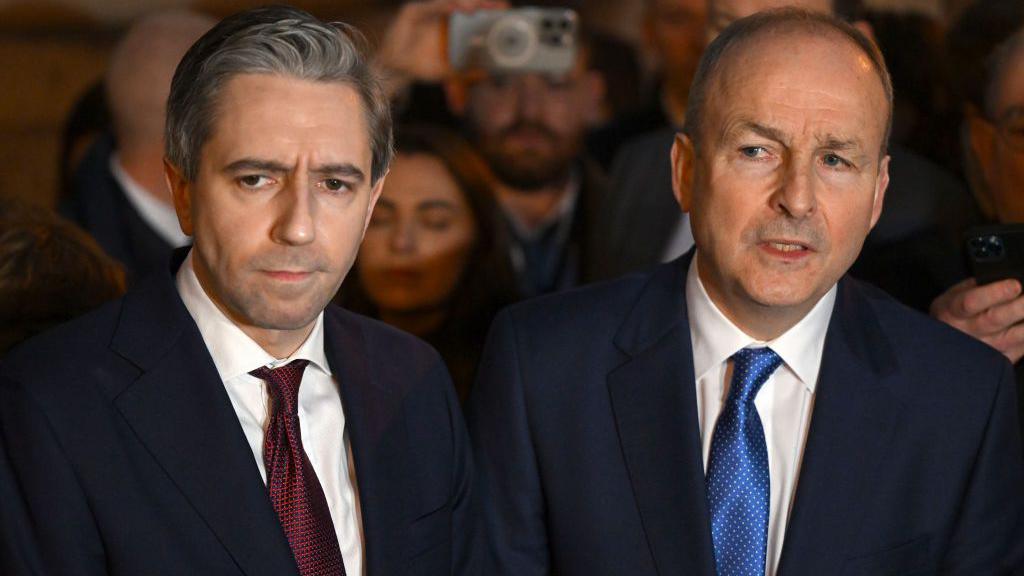
Simon Harris (left) and Micheál Martin criticised opposition politicians following a day of chaos in the Dáil
Ceann Comhairle (Speaker) Verona Murphy said she would consider submissions opposing the plan, but permitted the group to "provisionally" take their original seats for now.
All other opposition groups are against the idea, saying the independents who were supporting the government wanted to be in government and opposition at the same time and were taking time away from those who wish to scrutinise the government.
Discussions took place throughout Wednesday to try to find a solution but the talks failed.
There were bitter exchanges across the chamber on a number of occasions before Murphy said proceedings would resume on Thursday morning as she was shouted down by opposition TDs.
As Murphy returned to the chamber at 16:00 after a number of suspensions, opposition TDs rose to their feet.
The ceann comhairle then abandoned plans to elect a taoiseach, with proceedings ending in shouting between TDs.
'Resume your seats, I am going to be left with no option'
Harris said the disruption on Wednesday was utterly farcical, describing it as an effort to "obstruct and shout down, to disrespect the Ceann Comhairle and the constitutional office".
Martin said the delays were a "premeditated, coordinated and a choreographed position by the opposition, in particular the Sinn Féin party".
However McDonald claimed the government had "demonstrated incredible arrogance".
What changed on Thursday?
On Thursday morning Ceann Comhairle (Speaker) Verona Murphy ruled that those independent TDs supporting the government would not be given a status of an opposition technical group for the day's Dáil sitting.
The government also committed to addressing some of the issues raised by the opposition parties
Welcoming the move, Sinn Féin leader Mary Lou McDonald said the government has now "finally acknowledged that there has to be differentiation between government and opposition and no TD can be in government and opposition".
Who will make up the new government?
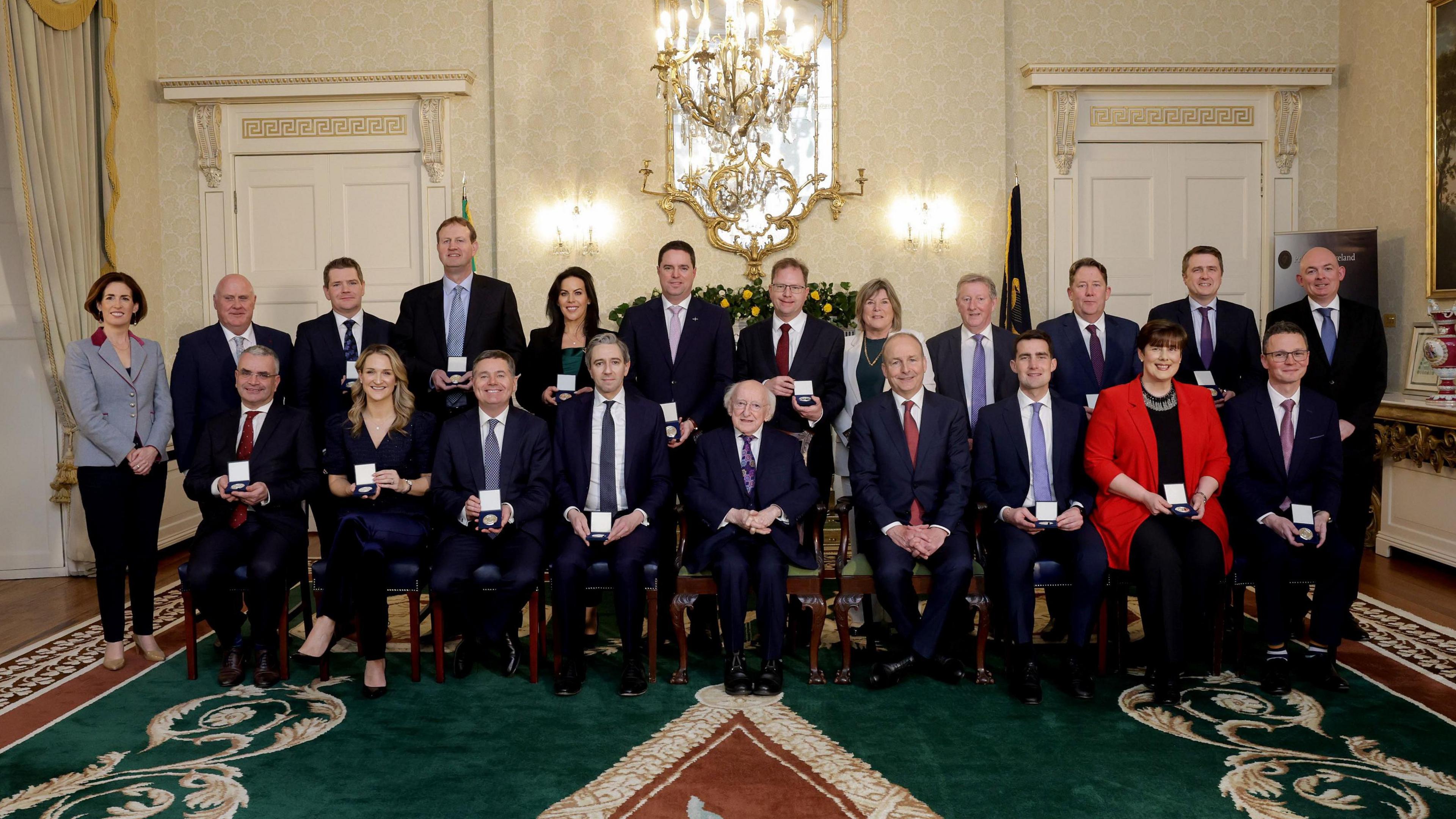
The incoming ministers received their seals at Áras an Uachtaráin on Thursday evening
Here are the ministers that will make up the new Irish government:
Simon Harris
Tánaiste and Minister for Foreign Affairs and Trade and Minister for Defence.
Paschal Donohoe
Minister for Finance.
Jim O'Callaghan
Minister for Home Affairs, Justice and Migration.
Jennifer Carroll MacNeill
Minister for Health.
James Lawless
Minister for Further and Higher Education, Research, Innovation and Science
Peter Burke
Minister for Enterprise.
Jack Chambers
Minister for Public Expenditure.
Darragh O'Brien
Minister for Transport, Environment and Energy.
Norma Foley
Minister for Children, Disability and Equality.
Patrick O'Donovan
Minister for Arts, Culture, Communications, Media and Sport.
James Browne
Minister for Housing, Local Government and Heritage.
Helen McEntee
Minister for Education and Youth.
James Lawless
Minister for Higher Education.
Martin Heydon
Minister for Agriculture.
Dara Calleary
Minister for Social Protection and Minister for Rural, Community Development and the Gaeltacht
Mary Butler
Government Chief Whip, with the added responsibility of mental health.
Rossa Fanning
Attorney General.
Scenes not witnessed in a century
Analysis: Enda McClafferty, political editor
It is not the start Michael Martin wanted or expected as he returned to the taoiseach office for the second time
His election was delayed by 24 hours after yesterday's chaotic scenes in the Dáil.
The scars of that bruising session have set the tone for the new Dáil.
But Martin is a seasoned politician and has weathered many political storms
He will though be tested given the scale of the challenges facing the new government in dealing with the housing and health crisis
Not to mention the potential economic fallout from the return of another political leader to power this week – US President Donald Trump
- Published22 January
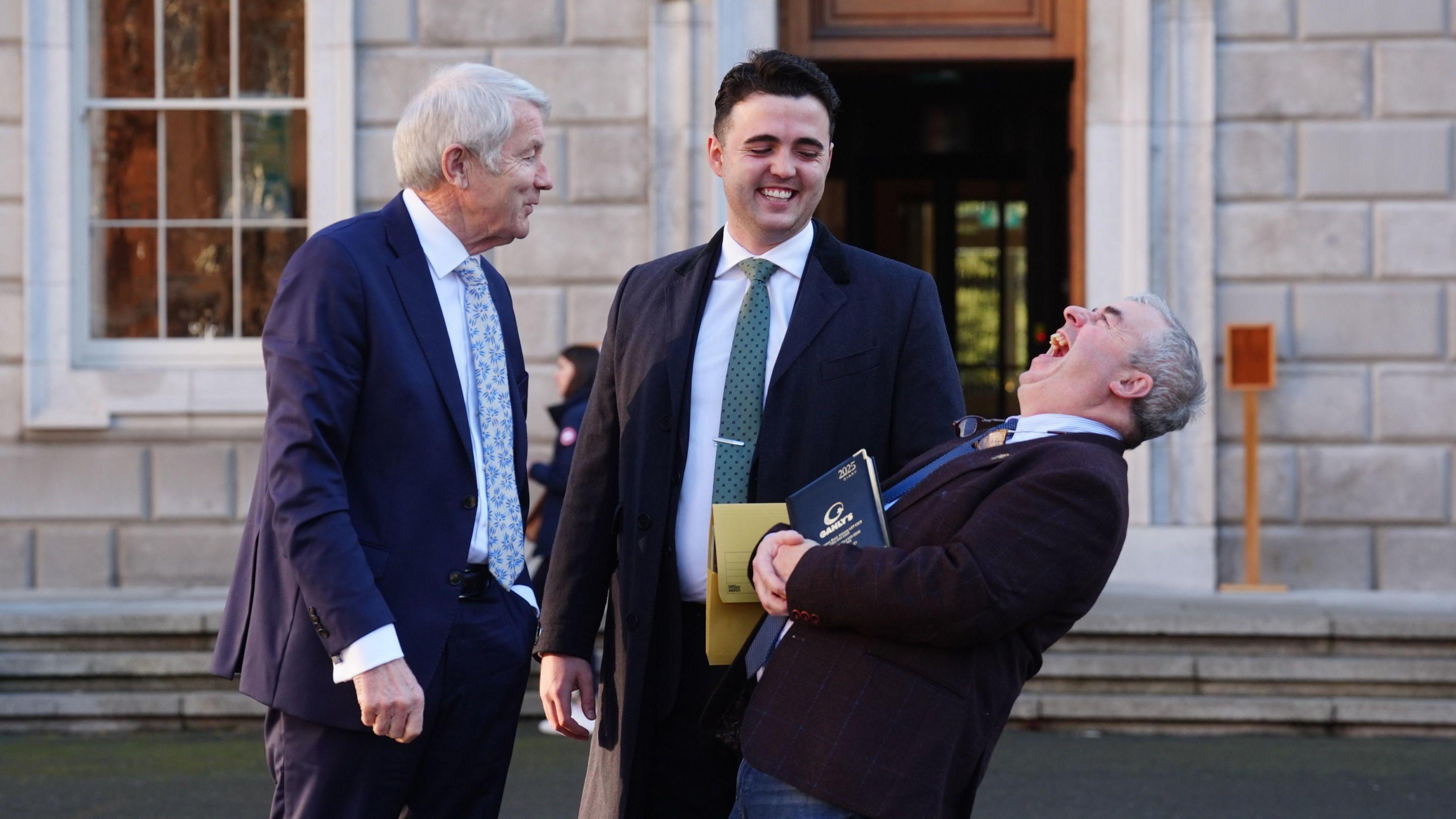
- Published18 December 2024
